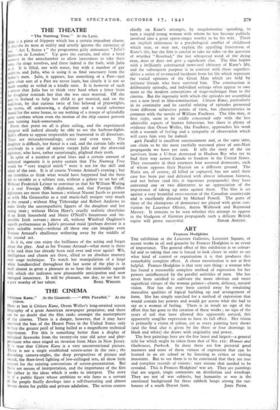ART
Frances Hodgkins
THE exhibition at the Leicester Galleries, Leicester Square, of recent works in oil and gouache by Frances Hodgkins is an event of importance. The general effect of this exhibition is so colour- ful and so taking that one is forced to look closer in order to see what kind of control or organisation it is that produces this remarkably complete effect. A closer examination is not at first helpful. Frances Hodgkins is that very rare thing : a woman who has found a reasonably complete method of expression for her powers uninfluenced by the parallel activities of men. She has never been satisfied to cultivate the more obvious and more superficial virtues of the woman painter—charm, delicacy, natural vision. Nor has she ever been carried away by emulating masculine qualities of logical building up and arrangement of form. She has simply searched for a method of expression that would contain her powers and would get across what she had to say as a woman of feeling. There is in result no sign of the effort that has gone to the creation of these works ; no sign of the years of toil that have allowed this apparently natural, this apparently songlike expression to have its full effect. Her vision is primarily a vision of colour, yet as every painting here shows (and the final clue is given by the three or four drawings in black and white) she draws with originality and power.
The best paintings here are the five latest and largest—a general title for which might be taken from that of No. Ho: Houses and Outhouses, Purbeck. In these there are few pictorial good manners and none of those virtues of expression that can be learned in an art school or by listening to critics or visiting museums. But to see them is to be convinced that they are true and complete records of .visions : rare visions that needed to be revealed. This is Frances Hodgkins' war art. They are paintings that are urgent, tragic comments on dereliction and wreckage. They are not of war subjects, but humanity at war is the emotional background for these rubbish heaps among the out-
houses of a south Dorset farm. JOHN Pout.


























 Previous page
Previous page